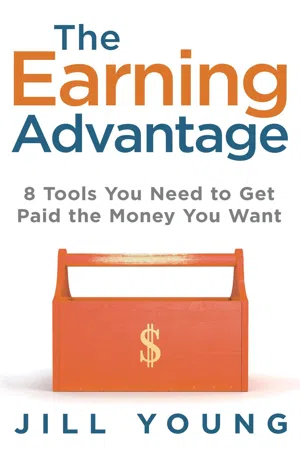
- English
- ePUB (mobile friendly)
- Available on iOS & Android
About This Book
Is a pay raise in your future?
Most employees lack clarity about how their performance connects to the value they create for their company. The Earning Advantage is a unique resource for employees to earn more money while promoting their company's growth.
Author Jill Young draws upon her thousands of hours of coaching experience to offer practical advice that helps team members deliver a star performance and encourages managers to foster healthy work environments. Everyone in your organization can thrive when they're working toward a shared vision.
This step-by-step guide will
•start a constructive conversation about a pay increase
•raise awareness about how to contribute at a higher level
•reveal the 8 tools you need to get paid the money you want
•build a solid action plan for propelling you toward a higher income
Create a better future for yourself and your company starting today!
Frequently asked questions
Information
YOUR MINDSET
The employee used:
|
The boss was thinking:
|
Fear: “I’m going to leave if I don’t get more money.”
|
Okay, leave.
Not a team player.
Not committed to his co-workers or the company.
Not loyal.
Short-sighted.
|
Guilt: “I’ve been here for two years and have not received a raise.”
|
But you’re still doing the same amount of work.
So?
What are you doing to better the company or yourself?
|
Justification: “I do so much for this company; I should be making more.”
|
I feel bad I don’t have more to offer her.
We all should be making more.
Does she know that I didn’t pay myself last month to cover her paycheck?
|
Shame: “My friend at makes more than I do and works less hard.”
|
Then maybe you should work there too.
I wonder if I’m a bad boss.
How does the other company do it? What other corners are they cutting?
That’s a lie.
|
Whining: “I need a raise because I have to pay for .”
|
We all have needs.
Is it a need or a want?
If he can’t manage his money, can he manage his job?
|
Table of contents
- Testimonials
- Other Books by Jill Young
- Title Page
- Copyright
- Dedication
- Contents
- Introduction
- You Are Here! But Why?
- How to Get the Most out of This Book
- When This Won’t Work
- How to Read This Book
- We Can Do This!
- Why Do You Need Me?
- Section 1: Your Mindset
- Myths You Need to Stop Believing
- The Big Idea You Need to Start Believing
- Strategies That Don’t Work
- What Do I Mean by “Producing Value?”
- Producing Meaningful Work
- Will You Be a Producer?
- Section 2: Your Boss’s Mindset
- Your boss is thinking, “I want to promote you.”
- Your boss is thinking, “Please, make my life easier.”
- Your boss is thinking, “I’d rather lead than manage.”
- Your boss is thinking, “What will your contribution be?”
- Section 3: Your Toolbox
- Compartment 1
- Compartment 2
- Compartment 3
- Compartment 4
- Let’s Do a Toolbox Inventory!
- My Invitation to You
- Appendices
- Appendix A: Assessments!
- Appendix B: Sample Written Plan and Template
- Acknowledgments